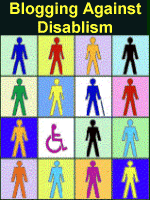 Since learning about my daughter’s diagnosis of Down syndrome and my son’s diagnosis of Non-Verbal Learning Disorder in the early 1990’s I have embraced advocacy skills—the skills of ‘speaking up.’ I have learned about successful advocacy through workshops, books and mentors and I have used these skills to change my kids’ personal situations, to improve systems and to promote public policies that support the recognition of the full citizenship of people with disabilities. Along the way I have picked up a few tricks that aren’t usually mentioned as advocacy skills, yet they work for me. Perhaps you will find them useful as well…
Since learning about my daughter’s diagnosis of Down syndrome and my son’s diagnosis of Non-Verbal Learning Disorder in the early 1990’s I have embraced advocacy skills—the skills of ‘speaking up.’ I have learned about successful advocacy through workshops, books and mentors and I have used these skills to change my kids’ personal situations, to improve systems and to promote public policies that support the recognition of the full citizenship of people with disabilities. Along the way I have picked up a few tricks that aren’t usually mentioned as advocacy skills, yet they work for me. Perhaps you will find them useful as well…
Last time I told you to channel
Colombo, today I want you to channel Glinda the Good Witch.
But don’t worry, I am not going to ask all of you to float around in bubbles and you will never have to say, “And Toto too,” in that Glinda way! This is a real advocacy skill for use with real problems—even big, difficult, snarly problems.
Let’s face it. When we go to our meetings, whether we are working on an IEP, a job idea, legislation we would like to see, meetings with our school board, etc there will be people who have ideas about what will work for us or our child that are just wrong. We want to scream “NO!!!” at the top of our lungs. We want to follow everything we hear them say with “BUT, what about….?” And really, who could blame us?
Our ‘
NO’ can be a very powerful tool and putting up with the unacceptable is, well….unacceptable.
‘No’ can be the perfect word in some situations and, sometimes, taking another tack can be even more useful.
Here’s the deal:
‘No’ is a powerful word, and it is the word that EVERYONE hates to hear. Using it sets up an argument which immediately makes the other person in your conversation dig deeper into their own position—against you. This is true whether you are talking to 2 year olds or directors of special ed.
‘But’ is a negator. It is used to say that everything that was said before the ‘but’ is not actually true. (Think about that phrase, “I love you, but….” See, it IS a negator!) When we say ‘but’ we say that everything you said before, or that they said before, isn’t so—again setting up an argument. (However and yet are also negators, so don’t even try it!)
Now I can be a little feisty, and I actually enjoy a good argument now and again and there are also times when arguments really don’t work for me. First of all, the other side usually becomes more dug-in when we argue… and some people actually go into meetings with me PREPARED to argue! (Can you believe it??) Second, while I am happy to argue to advance my position, arguing to lose ground or even to stay in the same place forever does not work for me—I have neither the time nor the energy!
Channel ever-positive Glinda: Use ‘
Yes’ and ‘
And’ instead and watch what happens.
Imagine that you are at a school board meeting and the sports boosters are proposing expensive updates to the football field—while special education languishes.
It isn’t hard to predict the fireworks that could so easily happen and could go on for the next several months.
On the other hand, what would happen if we went with a Yes/And approach?
If a dad stood up and said, “YES, I agree, the updates to the football field are long overdue. We have kids who need football scholarships to build their futures and the district should support them in this—plus we are all big fans! AND we need to bump up the special education program because our kids with disabilities need specific services to build their futures and we need to support them too!
What has happened here? Several things:
• You have surprised folks who expected a fight.
• You have suddenly made allies of the second-most involved parents in your school (and who knows when they might be allies for you?)
• You have gotten your board thinking about possibilities instead of all-or-nothing choices. They may even come up with a way to do both, but even if they can't they are more likely to do the right thing and without blaming “those kids” and “those parents” for their decisions.
This works in a myriad of places.
When your child’s teacher says we are worried about little Doogie’s _______________ (fill in your own issue) so we are going to implement ____________________________ (fill in your own ridiculous plan that could never possibly work) so that his independent skills will improve.
Say, “
YES! We are also concerned about Doogies’ ____________ and we agree that independent skills are the goal.
AND we think that implementing _________________ will give him the supports to do just that."
The whole dynamic can change sometimes with these two little words AND to think “You had the answer inside of you the whole time.” Thank you, Glinda!
Picture
here.











